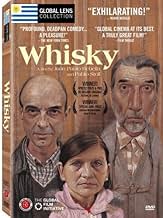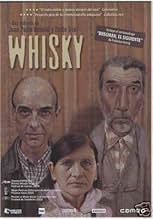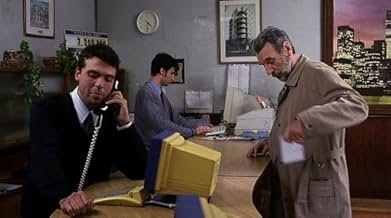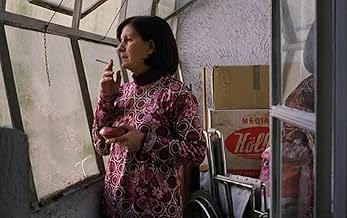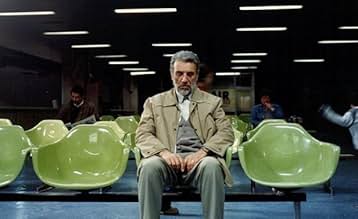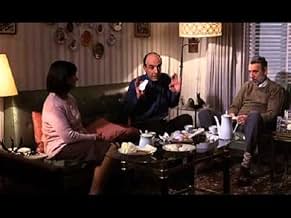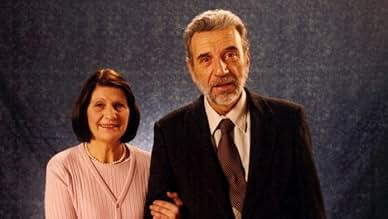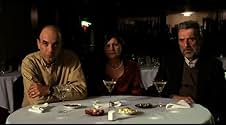Whisky
- 2004
- 1h 39m
When his long-lost brother resurfaces, Jacobo, desperate to prove his life has added up to something, looks to scrounge up a wife. He turns to Marta, an employee at his sock factory, with wh... Read allWhen his long-lost brother resurfaces, Jacobo, desperate to prove his life has added up to something, looks to scrounge up a wife. He turns to Marta, an employee at his sock factory, with whom he has a prickly relationship.When his long-lost brother resurfaces, Jacobo, desperate to prove his life has added up to something, looks to scrounge up a wife. He turns to Marta, an employee at his sock factory, with whom he has a prickly relationship.
- Directors
- Writers
- Stars
- Awards
- 23 wins & 7 nominations total
- Karina (empleada fábrica 1)
- (as Verónica Perrota)
- Empleado Cambio
- (as Ignacio Mendy)
- Fotógrafo
- (voice)
- Hija de Herman Köller
- (as Leonor Svarkas)
- Directors
- Writers
- All cast & crew
- Production, box office & more at IMDbPro
Featured reviews
This movie is subtle, and thoroughly enjoyable. The performance of the actors is simply incredible. Marta is a demure middle-aged woman who probably has not shared much love in her life. You can sense her burning desire to settle down and to share love and shelter with a man. Jacobo and Hernan are two brothers with opposite personalities. They have never talked to one another, and it is probably too late now. Each of them is clumsy and unintentionally cruel in his own special way. The two directors did an amazing work in the script. So little is said, or even shown, and so much can be felt about the characters (the two brothers who failed to deal with their emotions, about Marta and her life). The movie is also a chance to see some of Uruguay, particularly Montevideo and the seaside. A very nice break from Hollywood well-formated products. We'll wait for the new opus from these two young directors with great anticipation.
The Uruguayan directors Pablo Stoll and Juan Pablo Rebella, following their previous effort 25 Watts (2001), once again centre their story in the small, provincial town of Montevideo. Jacobo Koller owns a modest sock factory that employs a few local women, including Marta. A year after his mother's death, his successful businessman brother Hermann visits from Brazil to attend the memorial. Jacobo requests that Marta pretends to be his wife while his brother stays. After the ceremony, the three take an impromptu trip to a small seaside resort.
While this premise may sound overly familiar from a million-and-one lightweight US sitcoms, the delivery is never short of fresh and intriguing. It rarely approaches the sort of twee sentimentality we might expect after reading a short synopsis. Almost nothing is said for the first half of the film as we observe the characters' drab, innocuous lives. And yet, despite this, the film somehow succeeds in upholding a surprisingly light and comic atmosphere. There are genuine moments of deadpan humour. The actors (schooled in the reticence of the national theatre) never force the comedy, in fact it is more often the camera that delivers the punchline; the constant repetition and rituals, the framing of the lanky Jacobo and squat Marta and a sudden romantic karaoke sequence that is all the more touching for its spontaneity.
Like the titular drink, Whisky is warm, satisfying and definitely suitable for repeat viewings.
You go through the routine of sleeping and waking at the same times, travelling to work on the public bus, spending your day at your job which doesn't give you any kind of immediate remuneration. Your mind idles off to whether the money for the job is worth spending your life on, then you take the public bus home again, looking out at the sights you are used to, listening to the music you feel the most comfortable in. And usually on this bus ride home, most of the angst you feel in the morning is replaced by a irrepressible fatigue that tells you honestly that life is not just about chasing pipe dreams; life is also about going through it as best you can and surviving.
And as this goes on you get used to not expecting much out of life, not expecting much out of relationships, because that's the easiest way to be, just being. There is not much need to expand, really. There is not much need to feel the crests and falls of emotions. There is not much need to continue seeking, to continue dreaming, to continue hoping. And this is by no way any mistake; this is only part of the process of going through life, getting eased into it to not allow yourself any more anger that comes from lost hopes. Soon, as you get settled into your groove, you don't find going through the same days mundane anymore. You don't question what is expected of you out of life. You don't feel the need to keep expanding and expanding anymore.
Once in a while, you grant yourself the pleasure of watching a picture in a darkened cinema, vicariously and voraciously living the lives of people you don't know; people whose lives seem more exciting than yours; people who experience highs and lows so much that you feel as if you are experiencing the same highs and the same lows. You sit alone in the darkened theater by yourself--you are used to being alone--while somewhere else behind you, young couples are busy checking each other's necks out with their tongues. You see this, but you don't bother. You are only interested in the people living on the screen with you, sharing with you their pains and their hopes. Then you walk out of the cinema, and your life returns back to you. You realize that it is only a short relief, before you have to face reality again, the reality that you are really not so special.
Sometimes, the people in the movies cease being characters. They cease becoming people whom you fantasize about or feel pity for. Their lives suddenly seem so mundane and simple to you, and like you, they have stopped dreaming and started living in the real world. You see their everyday movements, everyday actions of endless repetition, and their normal, placid emotions that do not dare affect them in their daily lives. You grow so used to the repetitive actions, the repetitive shots, the repetitive dialogues, their every movement, that you find them so familiar. You feel as if you are sharing in some of their private lives, even if it is just make-believe. And when they discover something kind or special in their routine lives, your eyes widen and your heart fills with warmth. Mundane lives can be so beautiful too! You tell yourself secretly.
And in their daily effort to live, you see how their lives subtly affect other people's lives. You see how such small acts of kindness, can gladden your heart. You see how they are used to their loneliness, and then when they find companionship, you see how gladly they hang on to them, no matter how minute their friendship may seem. You see how comical they are in their lonesome blues, and you sneak a laugh at them, knowing fully that at the same time, you are laughing at yourself and with them too. Then you find that after all, there is comedy in pathos, and there is sorrow in bliss too.
At the end of the movie, the movie ends and the characters fade away into the blackness of the screen and the dark recesses of your memories. And suddenly you miss the repetition that bored you earlier, the simple mundaneness that was conveyed so simply. As you walk out of the cinema and see people walking out together with you, you feel more alone than ever before, as you're deprived of your newfound friends that you have fallen in love with in that short span of 95 minutes; like when you get used to being with other people, being lonesome again suddenly seems so difficult. And as you sit at the back of the cab on your way home, you feel that you've lost something special, even if that specialness came from make-believe situations, and a tear runs slowly down your cheek.
Did you know
- TriviaJuan Pablo Rebella's last film.
- Quotes
Marta Acuña: Namreh Rellok.
Herman Koller: Come again?
Marta Acuña: Your name spelled backwards. Herman Köller.
Herman Koller: How is that?
Marta Acuña: Namreh Rellok.
Herman Koller: Huh! That's great. Say something else.
Marta Acuña: Like what?
Herman Koller: Um..."Hello, how are you?".
Marta Acuña: Olleh, woh era ouy?
Herman Koller: [laughs] That's great. Say "the sea is choppy".
Marta Acuña: Eht aes si yppohc.
[both laugh]
Herman Koller: "The girl plays with the dog".
Marta Acuña: Eht lrig syalp tihw eht god.
Herman Koller: "The wind swings the palm tree".
Marta Acuña: Eht dniw sgniws eht mlap eert.
Herman Koller: That's great. How do you do it?
Marta Acuña: I don't know. When I was little I'd get bored and read words backwards. I'd listen to conversations and spell them backwards.
Herman Koller: [looks at Jacobo walking towards them] "Jacobo is upset".
Marta Acuña: Obocaj si tespu.
[both laugh]
- How long is Whisky?Powered by Alexa
Details
- Release date
- Countries of origin
- Official sites
- Languages
- Also known as
- Viski
- Filming locations
- Production companies
- See more company credits at IMDbPro
Box office
- Budget
- $500,000 (estimated)
- Gross worldwide
- $633,761
- Runtime1 hour 39 minutes
- Color
- Sound mix
- Aspect ratio
- 1.85 : 1
Contribute to this page


